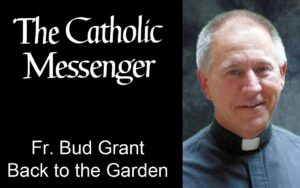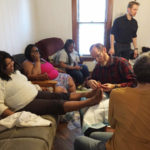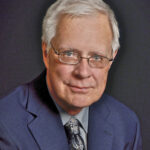 “The Lord Jesus made the deaf to hear and the dumb to speak. May he soon touch your ears to receive his Word and your mouth to proclaim his praise.” This baptismal blessing echoes Jesus’ “Ephphatha” miracle (Mk. 7:31-37) which, in turn, fulfills Isaiah 35:5: “The eyes of the blind will be opened, the ears of the deaf be cleared.” These miracles weren’t just for the afflicted, as disabilities are not impediments to faith. Jesus offers insight, not mere sight. Spiritual deafness, muteness and blindness are the truly crippling infirmities (Jn. 9).
“The Lord Jesus made the deaf to hear and the dumb to speak. May he soon touch your ears to receive his Word and your mouth to proclaim his praise.” This baptismal blessing echoes Jesus’ “Ephphatha” miracle (Mk. 7:31-37) which, in turn, fulfills Isaiah 35:5: “The eyes of the blind will be opened, the ears of the deaf be cleared.” These miracles weren’t just for the afflicted, as disabilities are not impediments to faith. Jesus offers insight, not mere sight. Spiritual deafness, muteness and blindness are the truly crippling infirmities (Jn. 9).
Spiritual deafness means the inability to “receive” the Word of God. Spiritual dumbness is the incapacity to “proclaim” that Word. We don’t hear the Word either because no one proclaims it or because of impaired spiritual auditory faculties. The same holds true for speaking. We need proclaimers.
Prophets proclaim the Word which, problematically, is as frightening as a crucifixion: we aren’t likely to appreciate prophets. To be clear, prophets are not “seers” of the future. They are simply the most observant among us, spiritual meteorologists sensing the intensifying pressure of thunder clouds. Like a vigilant parent, they admonish us to consequences of our behaviors to which we are otherwise as oblivious as toddlers. In short, they warn of the trouble we are getting ourselves into.
Being as adept at sensing rainbows as the flood, prophets also promise us a postdiluvian future. Wise parents encourage their children with the consequences of good behavior. Prophetic threats and promises are really the same thing. For example, if we do not mitigate and adapt to climate change, the incipient suffering we already see will sweep the globe. That’s a threat, a warning derived from reading the signs of the times. Switch to, “If we do implement…” and we hear a promise: we avoid the worst suffering and better alleviate the suffering of those already afflicted. Climate scientists, ecologists, environmental ethicists (such as Pope Francis) are our prophets.
Yet proclaiming the prophetic Word is futile if we don’t listen (Mt. 11:15), our ears having been opened by the healing touch of Christ. For the baptized, if we don’t hear his voice it is because we aren’t listening. If we aren’t listening it is because we are frightened of what we might hear, and well we should be, because the promise of the resurrection is prefaced by the non-negotiable warning of inexorable crucifixion.
For some, especially in stressful times, it is instinctual self-preservation to circle the wagons, to vilify and repel differing ideologies, sexual preferences, skin color or accents. Similarly, under the strain of self-induced scandals, some leaders in the church were defensively deaf to whatever threatened their status. But even if we pass through the searing cauldron of the Word (1Pt. 1:7) we are then compelled to profess it (1 Cor. 9:16). This means challenging anyone who dismantles the environment, demonizes those who disagree, denigrates immigrants and despoils the commonweal for their own profit.
We Catholics must look to our own house (1 Tim.5:8). “The Church,” Karl Rahner said, “has always been a mess.” Seldom has it been messier. Misguided leaders, abetted by suppliant clericalism, have sewn a maelstrom (Hosea 8:7) by protecting status instead of children. We need, not better leaders, but different kinds of leaders: prophets who urge repentance and radical transformation of the institution. And after that? Christian hope is not in avoiding the cross but in rising from the tomb. The survival of the earth, let alone the church is not assured. Both are as fragile as a babe in a manger. We are, we have always been, one generation away from the precious flame blinking out. Yet, we possess the Word, the Eucharist, baptism and other sacraments of reconciliation, our rich Tradition. These are powers which “no ear has ever heard” before (Is. 64:4).
(Father Bud Grant is a professor of theology at St. Ambrose University in Davenport.)

The Catholic Newspaper of the Diocese of Davenport









